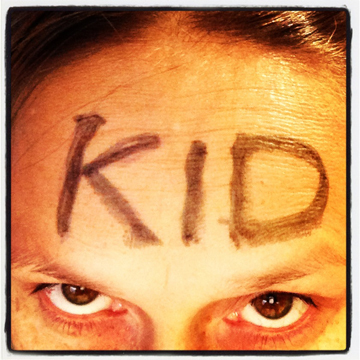
I pretty much suck at debating. Even when I have a strong opinion about something, when someone shares their opinion I usually smile, throw out a peace sign and say, "Good point, man, good point," or something like that. So I tend to just avoid it.
However, a recent article published on one of my favorite sites (Parents.com) entitled, "You'd Never Forget Your Child In The Car, Right?" has really got the accountability regulator in me stirring and I feel compelled to discuss it. The article tells a tragic story about parents whose children died after being accidentally left unattended in a hot car. In the content, they offer up some tips: Seven ways to not forget your child.
My initial response to these tips was, "WTF?"
Yes, there are some logical suggestions, such as put something next to the child that you need at your next destination. But as the Healing Vigilante, I cannot help but think, "Come on people -- we are better than that!" We may as well just do what's in the picture above (patent pending).
Is this where things are right now? Are these tips meant to meet society where it is? Has the level of awareness dropped so low that tips such as these are deemed necessary? Have Americans reduced themselves to so much acceptable distraction and detachment that the minimal level of presence is now expected, and excusable? To the point that we need reminders to not forget our child!?
Sadly, I think the answer is a resounding, "Yes."
There is a part in this article where a neuroscientist goes onto explain that, "These are not negligent parents who have forgotten their kids," and that their actions have to do with the "the basal ganglia, the "background system" that controls our habits" and allows us to do things on autopilot... and how the basal ganglia fights with the prefrontal cortex and hippocampus, which handles new content and, well, blah blah blah blah BLAH.
Maybe there is a scientific explanation as to why these parents did things a certain way. But the reality is: They were not present.
I am definitely not a perfect parent. Sometimes things slip my mind, I make mistakes, take stress out on the kids, zone out, etc. But I can assure you I never forget them. In my waking hours, not 17 minutes goes by without my thinking of them. It is not because I'm obsessive, exceptional or have special mom ninja skills -- it is a conscious decision. It is a choice to be present and mindful of myself, and them.
So, my solution and challenge for all parents: Be more present. Be better. Thrive. Hold yourself accountable to be more aware so things like this do not happen.
Here are nine ways to do that:
1. Make a commitment. Clearly choose to be more present for yourself and your children. When we slow down and make an official commitment, it means something. Tell your co-parent, friends, family and therapist about your commitment. Telling others helps you to be more accountable.
2. Pick a mantra. Pick a phrase to reinforce that commitment, such as, "I commit to being more present for my child." Or simply, "Be present."
3. Develop a habit of being present. Practice. Use the aforementioned basal ganglia to turn on autopilot when it comes to being present and mindful. For example:
• Wake up each morning and do five breaths, reinforcing the mantra. Say it out loud each time.
• Set an alarm every 30 minutes reminding yourself to be present. Take a deep breath, and repeat your mantra.
• Put sticky notes in key places throughout the day with your mantra written on it.
For all above examples, complete the practice with visualizing where your child is at that moment.
4. Practice conscious breathing. Being consistently aware of your breath enables you to calm the nervous system, relieve stress and agitation and therefore be more aware of the moment. Once again, use that basal ganglia of yours to develop this habit.
5. Reduce your stress. One of the leading causes of stress-related deaths is car accidents. It can also affect how the brain is functioning. Click here for stress relief tools.
6. Minimize distractions. We are currently living in an environment of easy distraction, with lots of ways to externally stimulate. Do an inventory of your current list of distractions and start to cross some out. Some suggestions while in the car:
• No music.
• No phone.
• Do #7.
7. Interact frequently. Make a conscious choice to interact with your children frequently when you are with them. Talk, sing, play, etc. Just do something other than nothing.
8. Ask for help. It is okay to admit that you need help with being more present. It is a new concept for a lot of people. If you are challenged in doing any of the above suggestions, then find yourself a good guide (i.e. counselor, life coach).
9. Educate Yourself. Do some reading: about Mindful Parenting, or on www.kidsandcars.org, which draws attention to some incidents we tend to forget can happen, and also the article referenced here to see how quickly a car heats up.
---
Note from the Author: I am filled with compassion for these people who are now living without their child because of their mistake. They are suffering beyond words, and the level of grief, guilt, and helplessness must be enormous. This article is absolutely not meant to condemn them, but rather for all of us to learn something even deeper from their actions.
